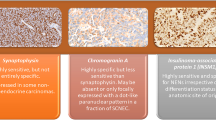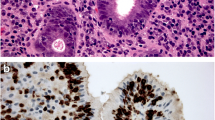Summary
This study concerns the cytogenetics of 23 gastric carcinomas, classified histologically as intestinal or diffuse types. In carcinomas of the diffuse type, the only numerical changes observed were Y chromosome loss associated with X-chromosome disomy in four of seven male patients. A46, XX karyotype without recognizable alterations was observed in three of five female patients, and rare structural changes in diffuse carcinomas involved chromosomes 1 and 18. In contrast, intestinal type tumors were exclusively aneuploid, with chromosome modes ranging from 48 to 84. The most consistent change was trisomy 20 in seven of 11 patients, each of which displayed a number of both single and clonal structural aberrations. Frequent structural changes were translocations involving chromosome 13 (including a putative isochromosome 13q in three of 11 patients), and alterations in chromosomes 1, 6 and 12. This study therefore suggests that diffuse and intestinal types of gastric carcinomas do not share a common sequence of genetic changes. The tumor with the worse prognosis (diffuse type) is surprisingly diploid, with uniform X-disomy in both males and females. The clinically less aggressive tumors (intestinal type) show multiple changes, both numerical and structural, of which some are reminiscent of changes seen in tumors of the lower gastrointestinal tract. Cytogenetics may thus be a valuable adjunct in establishing the diagnosis, classification, and prognosis of gastric carcinomas.
Similar content being viewed by others
References
Abe S, Golomb HM, Rowley JD, Mitelman F, Sandberg AA (1980) Chromosomes and causation of human cancer and leukemia. XXXV. The missing Y in acute non lymphocytic leukemia (ANLL). Cancer 45: 84–90
Bernstein R, Cain MJ, Cho J (1989) Loss of the Y chromosome associated with translocation t(6;9)(p23;q34) in a patient with acute nonlymphocytic leukemia. Cancer Genet Cytogenet 39: 81–87
Bos JL, Verlaan-der Fries M, Marshall CJ, Veeneman GH, van Boom JH, van der Eb AJ (1986) A human gastric carcinoma contains a single mutated and an amplified normal allele of the Ki-ras-oncogene. Nucleic Acids Res 14: 1209–1217
Camago M, Wang N (1980) Cytogenetic evidence for the absence of an inactivated X chromosome in a human female (XX) breast carcinoma cell line. Hum Genet 55: 81–85
Castedo S, Correia C, David L, Sabrinho-Simoes M (1991) Isochromosome 8q. A recurrent change in gastric carcinoma. Cancer Genet Cytogenet 54: 137–138
Dutrillaux B, Lejeune J (1971) Sur une nouvelle technique d'analysis du caryotype humain. CR Acad Sci (Paris) 272: 2638–2640
Dutrillaux B, Muleris M, Gebault Sereau M (1986) Imbalance of sex chromosomes, with gain of early replicating X, in human solid tumors. Int J Cancer 38: 475–479
Ferti-Passantonopoulou A, Panani AD, Vlachos JD, Raptis SA (1987) Common cytogenetic findings in gastric cancer. Cancer Genet Cytogenet 24: 63–73
Fujita K, Ohuchi N, Yao T, Okumura M, Fukushima Y, Kanakura Y, Kitamura Y, Fujita J (1987) Frequent overexpression, but not activation by point mutation, of ras genes in primary human gastric cancers. Gastroenterology 93: 1339–1345
Granberg I, Gupta S, Zech L (1973) Chromosome analysis of a metastatic gastric carcinoma including quinacrine flourescence. Hereditas 75: 189–194
Holmes RI, Keating RJ, Cork A, Trujillo JM, McCredie KB, Freireich EJ (1985) Loss of the Y chromosome in acute mylogenous leukemia: A report of 13 patients. Cancer Genet Cytogenet 17: 269–278
Jiang W, Kahn SM, Guillem JG, Lu SH, Weinstein IB (1989) Rapid detection of ras oncogenes in human tumors: aplications to colon, esophageal and gastric cancer. Oncogene 4: 923–928
Lauren P (1965) The two histological main types of gastric carcinoma: Diffuse and so-called intestinal type carcinoma. Acta Pathol Scand 64: 31–49
Di Lernia R, Magnani I, Doneda L, Rizzi R, Larizza L (1987) Cytogenetic instability in a family with gastric cancer recurrence. Cancer Genet Cytogenet 27: 299–310
Motomura K, Ishisho I, Taka SI, Tateishi H, Okasaki M, Yamamoto M, Miki T, Honjo T, Mori T (1988) Loss of alleles at loci on chromosome 13 in human primary gastric cancers. Genomics 2: 180–184
Muleris M, Salmon RJ, Dutrillaux B (1990) Cytogenetics of colorectal adenocarcinoma. Cancer Genet Cytogenet 46: 143–156
Nakajima K, Kuzumaki N, Oda A, Kobayashi H, Kato H, Tanabe T (1989) Immunhistochemical study of ras p21 expression in human gastric cancers and benign lesions. Oncology 46: 260–265
Ochi H, Takeuchi J, Douglass HO Jr, Sandberg AA (1984) Trisomy X as a possible initial chromosome change in a gastric cancer. Cancer Genet Cytogenet 12: 57–61
Ochi H, Douglass HO Jr, Sandberg AA (1986) Cytogenetic studies in primary gastric cancer. Cancer Genet Cytogenet 22: 295–307
Oda N, Tsujina T, Suda T, Yoshida K, Nakayama H, Yasiu W, Tahara E (1990) DNA ploidy pattern and amplification of ERBB and ERBB2 genes in human gastric carcinomas. Virchows Archiv [B] 58: 273–277
Ohuchi N, Hand PH, Merlo G, Fujita J, Mariani-Constantini R, Thor A, Nose M, Callahan R, Schlom J (1987) Enhanced expression of c-Ha-ras p21 in human stomach adenocarcinomas defined by immunoassays using monoclonal antibodies and in situ hybridization. Cancer Res 47: 1413–1420
Park JB, Rhim JS, Park SC, Kim SW, Krauss MH (1989) Amplification, overexpression, and rearrangement of the erb B-2 protooncogene in primary human stomach carcinomas. Cancer Res 49: 6605–6609
Pfaff M, O'Connor R, Vollmers HP, Müller-Hermelink HK (1990) Human monoclonal antibody against a tissue polypeptide antigen-related protein from a patient with a signet-ring cell carcinoma of the stomach. Cancer Res 50: 5192–5198
Powell I, Tyrkus M, Kleer E (1990) Apparent correlation of sex chromosome loss and disease course in urothelial cancer. Cancer Genet Cytogenet 50: 97–101
Rodriguez E, Rao PH, Ladanyi M, Altorki N, Albino AP, Kelsen DP, Jhanwar SC, Chaganti RSK (1990) 11p13-15 is a specific region of chromosomal rearrangement in gastric and esophageal adenocarcinomas. Cancer Res 50: 6410–6416
Saal K, Vollmers HP, Hoehn H, Müller-Hermelink HK (1989) Cytogenetic studies on human stomach carcinomas. Cancer Genet Cytogenet 38: 198
Sano T, Tsujino T, Yoshida K, Nakavama H, Haruma K, Ito H, Nakamura Y, Najiyama G, Tahara E (1991) Frequent loss of heterozygosity on chromosomes 1q, 5q, and 17p in human gastric carcinomas. Cancer Res 51: 2926–2931
Tahara E, Yasui W, Taniyama K, Ochiachi A, Yamamoto T, Makajo S, Yamamoto M (1986) Ha-ras oncogene product in human gastric carcinoma: Correlation with invasiveness, metastasis and prognosis. Jpn J Cancer Res 77: 517–522
Tahara E (1993) Molecular mechanism of stomach carcinogenesis. J Cancer Res. Clin Oncol 119: 265–272
Tzeng CC, Meng CL, Jin L, Hsieh HF (1991) Cytogenetic studies of gastric adenocarcinoma. Cancer Genet Cytogenet 55: 67–71
Vogelstein B, Fearon ER, Hamilton SR, Kern SE, Preisinger AC, Leppert M, Nakamura Y, White R, Smits AMM, Bos JL (1988) Genetic alterations during colo-rectal tumordevelopment. New Engl J Med 319: 525–532
Wang N, Cedrone E, Skuse R, Insel R, Dry J (1990) Two identical active X chromosomes in human mammary carcinoma cells. Cancer Genet Cytogenet 46: 271–280
Yanagihara K, Seyama T, Tsumuraya M, Kamada N, Yokoro K (1991) Establishment and characterization of human signet ring cell carcinoma gastric cell lines with amplification of the c-myc oncogene. Cancer Res 51: 381–386
Author information
Authors and Affiliations
Rights and permissions
About this article
Cite this article
Saal, K., Vollmers, H.P., Müller, J. et al. Cytogenetic differences between intestinal and diffuse types of human gastric carcinoma. Virchows Archiv B Cell Pathol 64, 145–150 (1993). https://doi.org/10.1007/BF02915107
Received:
Accepted:
Issue Date:
DOI: https://doi.org/10.1007/BF02915107




